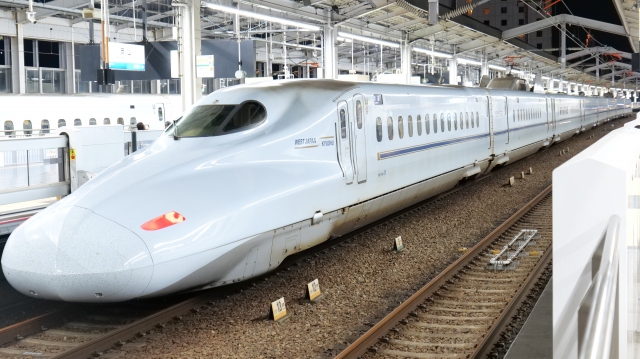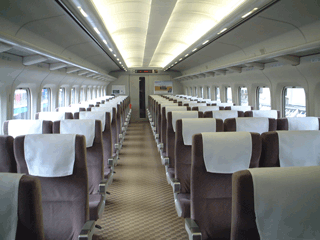JR Tokai and JR West will adopt a policy of all reserved seats (no unreserved seats) for the Tokaido Shinkansen and Sanyo Shinkansen (between Tokyo and Hakata) Nozomi-go trains during the Golden Week holidays in 2024.
Impact of Overtourism
The rapid increase in the number of tourists to a tourist destination can place a significant burden on local communities and the environment. This problem is known as “overtourism” and has become more serious in recent years, especially in Japan. A sudden increase in the number of tourists before the tourist population is ready to receive them can degrade the tourist’s experience of the natural and cultural heritage of a tourist destination and adversely affect the lives of residents and the environment.

JR Tokai and JR West will adopt a policy of all reserved seats (no unreserved seats) for the Tokaido Shinkansen and Sanyo Shinkansen (between Tokyo and Hakata) Nozomi-go trains during the Golden Week holidays in 2024. This measure will be implemented especially on the Tokaido Shinkansen and Sanyo Shinkansen and will be in effect for 11 days from April 26 to May 6.
The measure of all reserved seats on the Nozomi Shinkansen during Golden Week is also considered to be part of the solution to this overtourism problem. It is believed that the introduction of reserved seats is intended to reduce the burden on tourist destinations and transportation infrastructure by easing congestion and promoting more efficient seat usage.
However, tourists may find this change inconvenient. In particular, there is concern that the loss of free seat selection will limit the flexibility and freedom of travel. However, tourists should understand that this is part of an effort to protect you and the region and the environment and to achieve sustainable tourism.
In particular, the route from Tokyo to Hakata is known as the “Golden Route,” which takes tourists through Tokyo, Nagoya, Kyoto, Osaka, Okayama, Hiroshima, and Hakata, all of which are well-known tourist destinations.
This is quite a painful one.

Shinkansen System
During Golden Week, the elimination of non-reserved seats on the Shinkansen Nozomi is a major change from the previous operating pattern. The non-reserved seats normally provided in Cars 1-3 will be eliminated, and all seats will be pre-reserved. This means that users will have to reserve seats in advance.
This is a major change for Shinkansen users, as the measure of all reserved seats that has been in place during the Obon (summer) and year-end and New Year (winter) periods will also be applied during the Golden Week holidays in 2024. Since they will no longer be able to freely choose their seats as they have in the past, advance seat reservations will be required when making travel plans.
Until now, if you go to the station and stand in line for a free seat on the platform, you could sit down and travel from Tokyo to Kyoto, but this freedom will no longer be available.
This change is part of an effort to improve the efficiency of Shinkansen use. The elimination of unreserved seats is expected to eliminate long lines at platforms during the period, allowing more passengers to use the Shinkansen smoothly.
Reserved-seat-only period
In 2024, it is 11 days from April 26 to May 6 as Golden Week.
They have not yet decided on the no-reserved-seat period during the summer Obon season and the no-reserved-seat period during the year-end and New Year’s holidays in winter.
If the plan is not disclosed soon, tourists will be in trouble.
Diversification of transportation and other options
When considering the impact on tourists of the measure to have all seats reserved on the Shinkansen Nozomi, it is important to compare it with other means of transportation. In particular, air travel may be considered for travel to the Kansai region.
Airplanes have shorter travel times and can reach destinations faster than bullet trains. Airline ticket prices are also competitive with the Shinkansen, making it an economical option.
However, airplanes have more complicated procedures than the Shinkansen, such as access to the airport and security checks. The Shinkansen also has the advantage of allowing passengers to relax and enjoy the scenery on board.
Another option is the night bus.
This has the advantage of saving you one day of lodging costs.
Thus, each choice of transportation has its advantages and disadvantages. When choosing a means of transportation, tourists need to consider the distance to their destination, travel time, economy, and convenience to make the best choice.
It is also crowded during the Golden Week.
Summary
The measure to have all seats reserved during Golden Week on the Tokaido and Sanyo Shinkansen Nozomi trains is intended to counter the problem of overtourism and improve usage efficiency. This is expected to alleviate congestion on platforms and in the company and facilitate smooth use of seats. On the other hand, tourists need to consider the impact of limited freedom and changing transportation options. It will be necessary to compare the advantages and disadvantages of each means of transportation to make the best travel plans.
